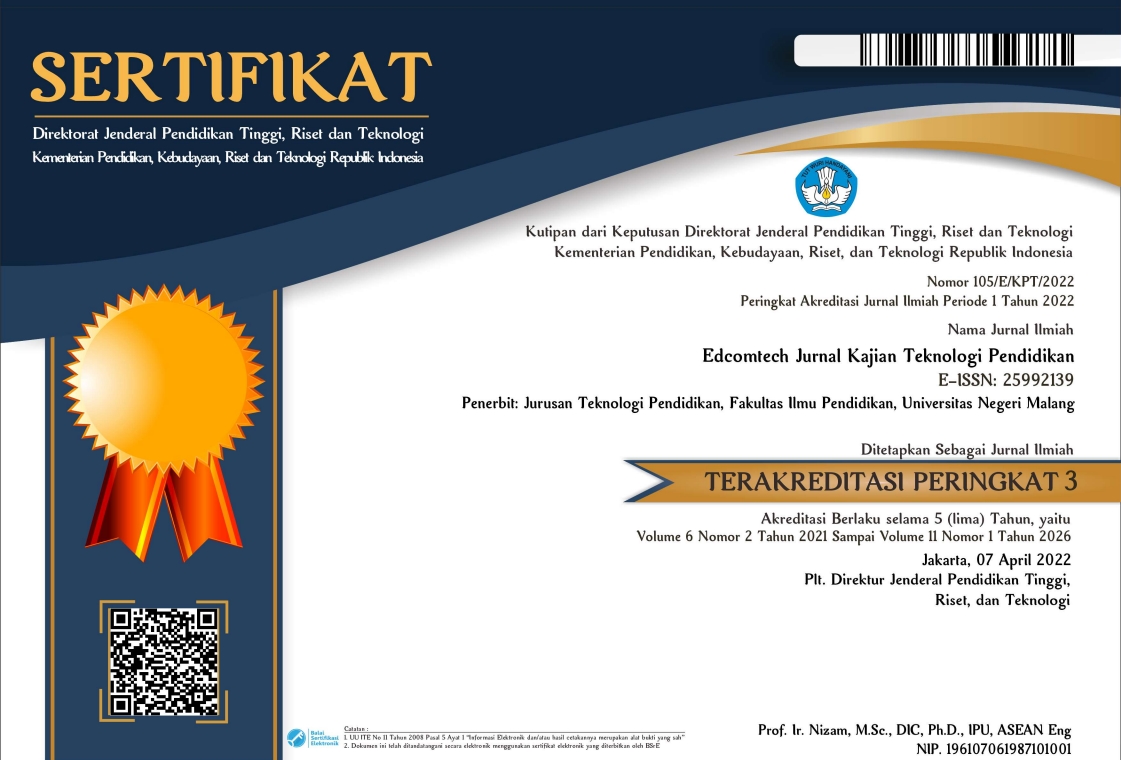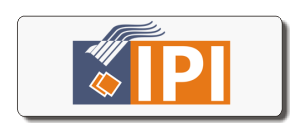Pengaruh Project Based Learning An Minat Belajar Terhadap Hasil Belajar Menggambar Bentuk (Still Life) dalam Pelajaran Visual Art
Abstract
Abstrak: Tujuan penelitian adalah: (1) Menguji pengaruh penggunaan model pembelajaran Project Based Learning (PjBL) siswa. (2) Menguji pengaruh minat belajar siswa. (3) Menguji pengaruh penggunaan model pembelajaran Project Based Learning (PjBL) dengan minat belajar terhadap hasil belajar menggambar Bentuk (Still life). Penelitian ini menggunakan desain eksperimen ulang (Pretest – Posttest Control Group Design), dengan melakukan randomisasi terhadap dua kelompok (kelompok kontrol dan kelompok eksperimen). Hasil analisis dalam penelitian sebagai berikut: 1) Ada pengaruh penggunaan model pembelajaran Project Based Learning (PjBL) terhadap hasil belajar Menggambar Bentuk (Still life) siswa. 2) Tidak terdapat pengaruh minat belajar terhadap hasil belajar menggambar Bentuk (Still life) siswa. 3) Tidak terdapat interaksi antara penggunaan model pembelajaran Project Based Learning (PjBL) dan model pembelajaran Langsung dengan minat belajar terhadap hasil belajar menggambar Bentuk (Still life) siswa.
Abstract: The research objectives are: (1) To examine the effect of the use of students' Project Based Learning (PjBL) learning models. (2) Test the influence of students’ learning interests. (3) Test the effect of the use of Project-Based Learning (PjBL) learning models with interest in learning towards learning outcomes in Drawing (Still life). This study used a pre-experiment design (Pretest - Posttest Control Group Design), by randomizing two groups (control group and experimental group). The results of the analysis in the study are as follows: 1) There is an influence of the use of the Project-Based Learning (PjBL) learning model on student learning outcomes in Drawing (Still life). 2) There is no influence of interest in learning on the results of learning to draw (Still life) students. 3) There are no interaction between Project Based Learning (PjBL) learning models and Direct learning models with the interest in learning towards students’ learning outcomes in Drawing (Still life).
Keywords
Full Text:
PDFReferences
Aldabbus, S (2018). Project-Based Learning: Implementation & Challenges. International Journal of Education, Learning and Development. Vol.6, No.3, pp.71-79, March 2018.
Arikunto, S. (2006). Prosedur Penelitian: Suatu Pendekatan Praktek. Jakarta: PT Rineka Cipta.
Aydın, S., Atalay, T. D., Göksu, V. (2018). Project-Based Learning Practices with Secondary School Students, International Online Journal of Educational Sciences, 10(3), 230-242
Chen, C. H., & Yang, Y. C. (2019). Revisiting the effects of project-based learning on students’ academic achievement: A meta-analysis investigating moderators. Educational Research Review, 26, 71-81.
Ching, F.D. (2002). Menggambar Sebuah Proses Kreatif. Yogyakarta: PT. Gelora Aksara Pratama.
Chiang, C. L. dan Lee, H. (2016). The Effect of Project-Based Learning on Learning Motivation and Problem-Solving Ability of Vocational High School Students. International Journal of Information and Education Technology, Vol. 6, No. 9,
Fathurrohman, M. (2015). Model-model pembelajaran Inovatif. Jogjakarta: Ar-Ruzz Media.
Grossman, P., Dean, C. G. P., Kavanagh, S. S., & Herrmann, Z. (2019). Preparing teachers for project-based teaching. Phi Delta Kappan, 100(7), 43-48.
Hamalik, O. (2010). Kurikulum dan Pembelajaran. Jakarta: PT Bumi Aksara.
Kamaril, Cut (2006). Pendidikan Seni Rupa/Kerajinan Tangan. Jakarta: FBS Universitas Terbuka.
Kızkapan, Oktay (2016) The Effect of Project Based Learning on Seventh Grade Students’ Academic Achievement1.
Mou, T. Y. (2019). Students' Evaluation of Their Experiences with Project-Based Learning in a 3D Design Class. The Asia-Pacific Education Researcher, 1-12.
Muharrar, S. (2003). “Tinjauan Seni Ilustrasi” Bahan Ajar Mata Kuliah Menggambar Ilustrasi. Jurusan Seni Rupa: Unnes.
Russeffendi, E.T. (2010). Dasar-Dasar Penelitian Pendidikan dan Bidang Non-Eksakta Lainnya. Bandung: Tarsito.
Sachari, A. (2002). ESTETIKA Makna, Simbol dan Daya. Bandung. ITB
Slameto. (2010). Belajar dan Faktor-faktor yang mempengaruhinya. Jakarta: Rineka Cipta.
Siburian, J., Corebima, A. D., & Saptasari, M. (2019). The correlation between critical and creative thinking skills on cognitive learning results. Eurasian Journal of Educational Research, 19(81), 99-114.
Sudjana, N. (2014). Penelitian Hasil Proses Belajar Mengajar. Bandung: Remaja Rosdakarya.
Sugiyono. (2010). Metode Peneiltian Administrasi. Bandung: Alfabeta.
Sulastianto, H. (2006). Seni Budaya Untuk Kelas VIII SMP. Grafindo Media Pratama Bandung
Sunaryo, A. (2006).”Bahan Ajar Seni Rupa I” Handout Jurusan Seni Rupa, FBS Unnes Semarang:Jurusan Seni Rupa FBS Unnes
Surahman, E., Kuswandi, D., & Wedi, A. (2019, December). Students' Perception of Project-Based Learning Model in Blended Learning Mode Using Sipejar. In International Conference on Education Technology (ICoET 2019). Atlantis Press.
Thomas, J. W. (2000). A review of research on project-based learning. San Rafael, CA: Autodesk Foundation.
Triarisanti, R., & Purnawarman, P. (2019). Interest and motivation on college students’ language and art appreciation learning outcomes. International Journal of Education, 11(2), 130-1135. doi:10.17509/ije.v11i2.14745
Ulger, K. (2019). Comparing the effects of art education and science education on creative thinking in high school students. Arts Education Policy Review, 120(2), 57-79.
DOI: http://dx.doi.org/10.17977/um039v5i22020p119
Refbacks
- There are currently no refbacks.
Copyright (c) 2020 Mustaji Mustaji Mustaji, Asdiansyah Asdiansyah Asdiansyah, Nurmida Catherine Sitompul

This work is licensed under a Creative Commons Attribution-ShareAlike 4.0 International License.
Edcomtech: Jurnal Kajian Teknologi Pendidikan published by Department of Educational Technology, Faculty of Education, State University of Malang in Collaboration with Asosiasi Program Studi Teknologi Pendidikan Indonesia (APS TPI) and Ikatan Profesi Teknologi Pendidikan Indonesia (IPTPI) with MoU.
Publisher Address:
Lab. Teknologi Pendidikan, Gd.E2, Lt.1
Fakultas Ilmu Pendidikan Universitas Negeri Malang
Jalan Semarang No 5, Kota Malang Kode Pos 65145
Email: edcomtech.fip@um.ac.id
========================================================================================================
| INDEXED BY | TOOLS | PLAGIARISM CHECK | ARTICLE TEMPLATE |
|

Edcomtech is licensed under a Creative Commons Attribution-ShareAlike 4.0 International License.
Edcomtech Statistics (Since July 13th, 2020)











1.png)








